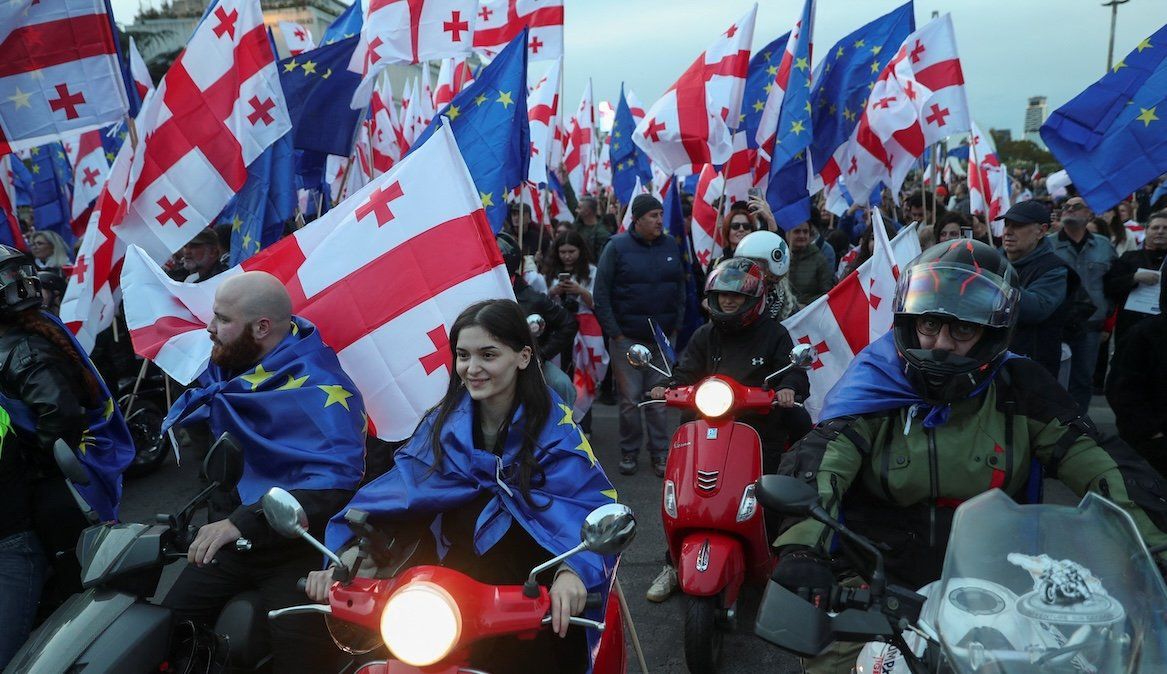The Eurasian country and former Soviet republic of Georgia – not the southern US state – is at risk of tilting back into Moscow’s sphere of influence. All eyes will be on the Oct. 26 election to see if the ruling Georgian Dream party – which has slowly shifted the country’s alignment away from Brussels and toward Moscow in recent years – retains control after these crucial parliamentary elections.
We spoke with Tinatin Japaridze, a Georgian-born regional analyst at Eurasia Group, about what’s at stake.
What is the pre-election atmosphere like in Tbilisi?
The atmosphere is simultaneously charged with anticipation and significant uncertainty about the election outcome. Political and social polarization has reached profound depths. The ruling Georgian Dream and the four main opposition coalitions appear disconnected from the majority of the public, who are increasingly feeling political fatigue toward the electoral process, even though many understand that the stakes are incredibly high.
What are the main issues for voters? Is Russia’s invasion of nearby Ukraine having an impact?
Since last spring, tens of thousands in Tbilisi have rallied in support of Georgia’s European future and against Russia’s ongoing aggression. Georgia, a former Soviet bloc country, is facing a critical choice – it can either move forward toward Europe or find itself reverting back toward Russia. It cannot pursue both paths at once. However, in rural areas, the decision is less clear-cut. While most recognize that the “European idea” is essential for Georgia’s growth and progress, this understanding often fails to address the immediate “bread and butter” needs of those living outside the few major cities.
TheGeorgian Dream, the ruling party, has been in power since 2012. Are they expected to win this election? What accounts for its enduring success?
A landslide win for the Georgian Dream is out of the question, and gaining a constitutional majority in the parliament seems very unlikely. That said, the ruling party is widely expected to garner more votes than any single political party – but probably not enough to avoid the need to form a coalition government with the opposition, which is a reality that neither side is prepared to accept. The “us vs. them” mentality will likely dominate amid deep-rooted interpersonal and intra-party tensions, significantly diminishing the prospects for collaboration between the two sides. Over the past year, as the ruling party started to gear up for what was clearly going to be the most competitive election it has faced since the Georgian Dream came to power in 2012, Russia has increased its support through official rhetoric and positive assessment of the ruling regime’s role in stabilizing relations with Moscow. There have also been thinly veiled, pro-Kremlin disinformation campaigns that have permeated the state-controlled media outlets.
Do you expect any unrest/violence around the election? A smooth government-formation process?
The days following the election will be pivotal in revealing the broader landscape, particularly because both sides will likely dispute unfavorable results. This is expected to lead to chaos, instability, and mass protests. Earlier this spring, up to 200,000 Georgians took to the streets in response to the Georgian Dream’s reintroduction of the controversial foreign agent law. If the election results, which may or may not become available on the night of Oct. 26, are unfavorable for the ruling party, the government and its security services are expected to attempt another violent crackdown. In the event of the Georgian Dream’s defeat by the opposition, a peaceful transfer of power is highly unlikely.
What will the election mean for the country’s relations with the West and with Russia?
The extent to which the West recognizes the election as free and fair will play a significant role here. If the international community rejects the results and the ruling party blatantly steals the vote, Tbilisi could experience increased isolation from the West. This would leave it more vulnerable to direct interference from Russia and increased involvement from China. By the same token, for the West, losing Georgia means losing its foothold in the South Caucasus, a situation neither the US nor Europe is prepared to accept. Western partners will use both incentives and deterrents to prevent Georgia from falling entirely under Kremlin influence.
